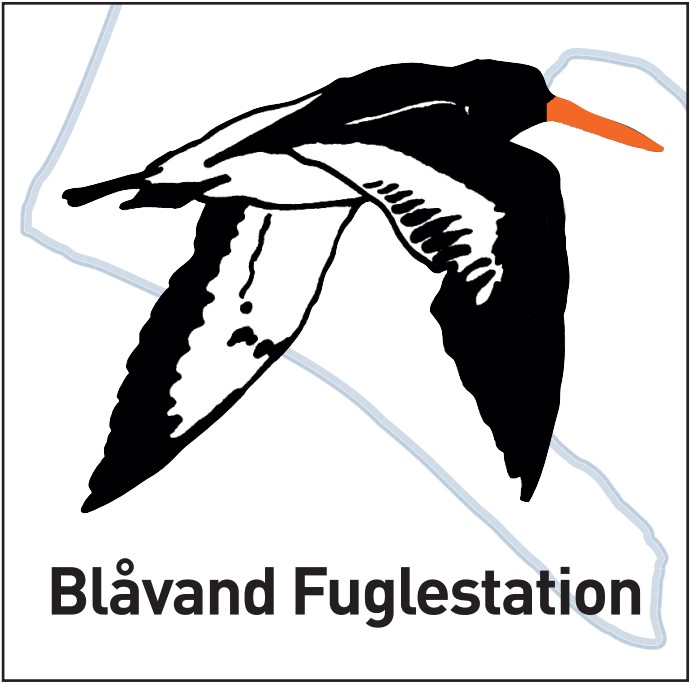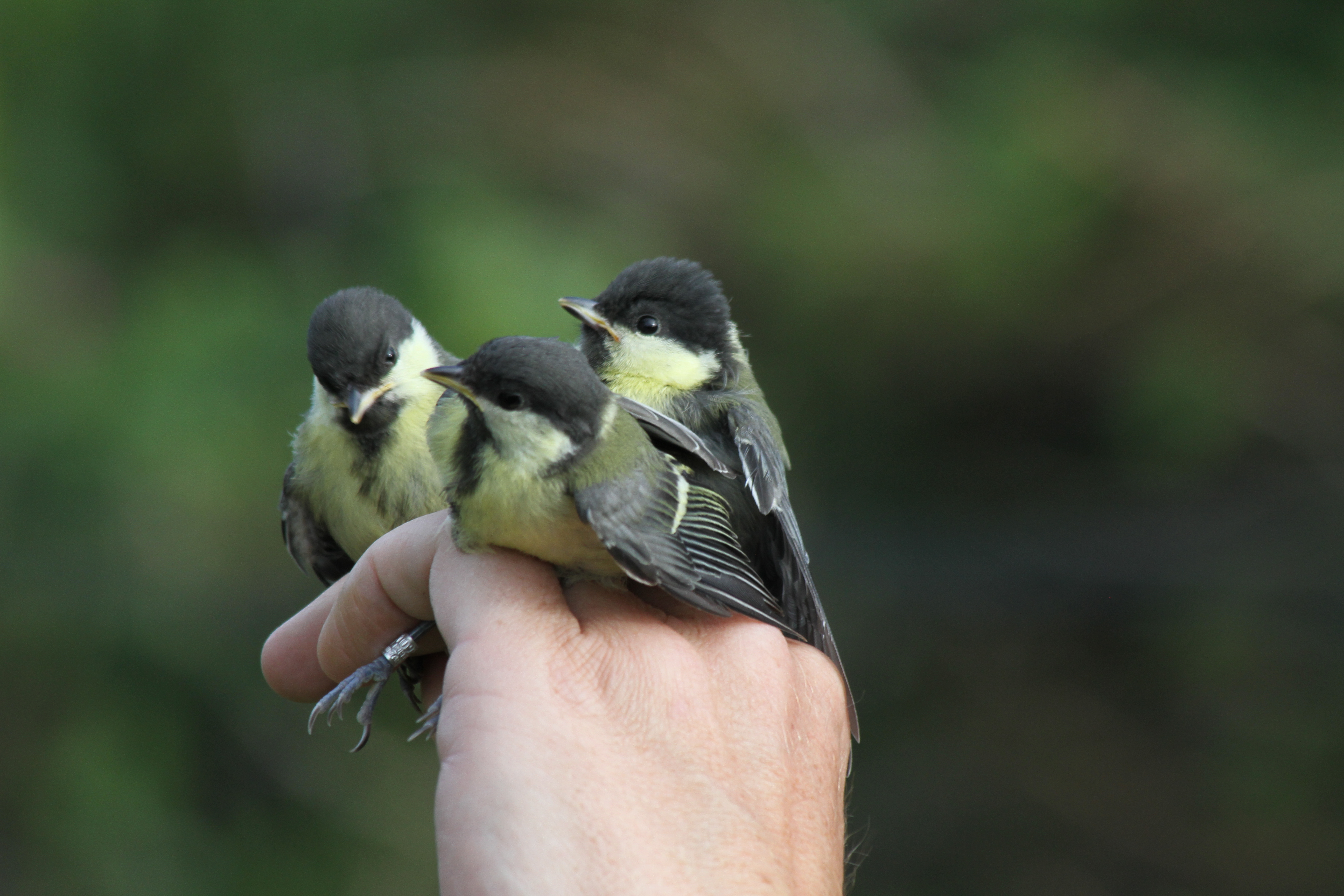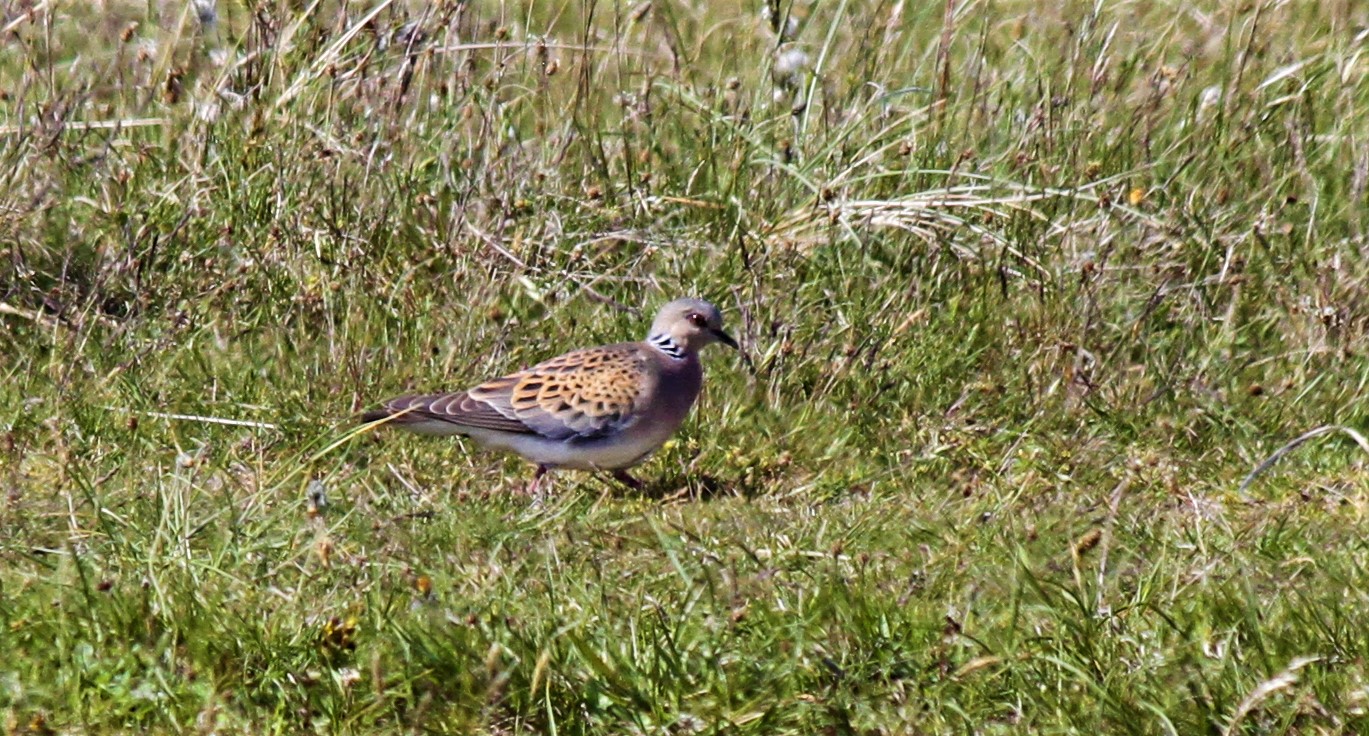Her på Blåvand's blog bringes korte nyheder i dagbogsformat om livet og hændelser på fuglestationen.
The heat brought us some excitements.
While the ringers opened the nets Henrik K, my friend Louise and I kept the beds warm. around 5 I woke up trying to do some seawatch. After a short while I heard some small calling sounds and cheked it out, and found the first rosefinch for the season, but it wasn´t the rosefinch that made the call it was a juvenile redpoll sitting next to it, just as i wanted to call it out on zello Henrik made a message that he found a Red-breasted Flycather in the area opposite of the station. When I came down morten was already there and i saw the tail of it but it was in the area for some time. Menno chaught a beauty of a Crossbill around 5 also! 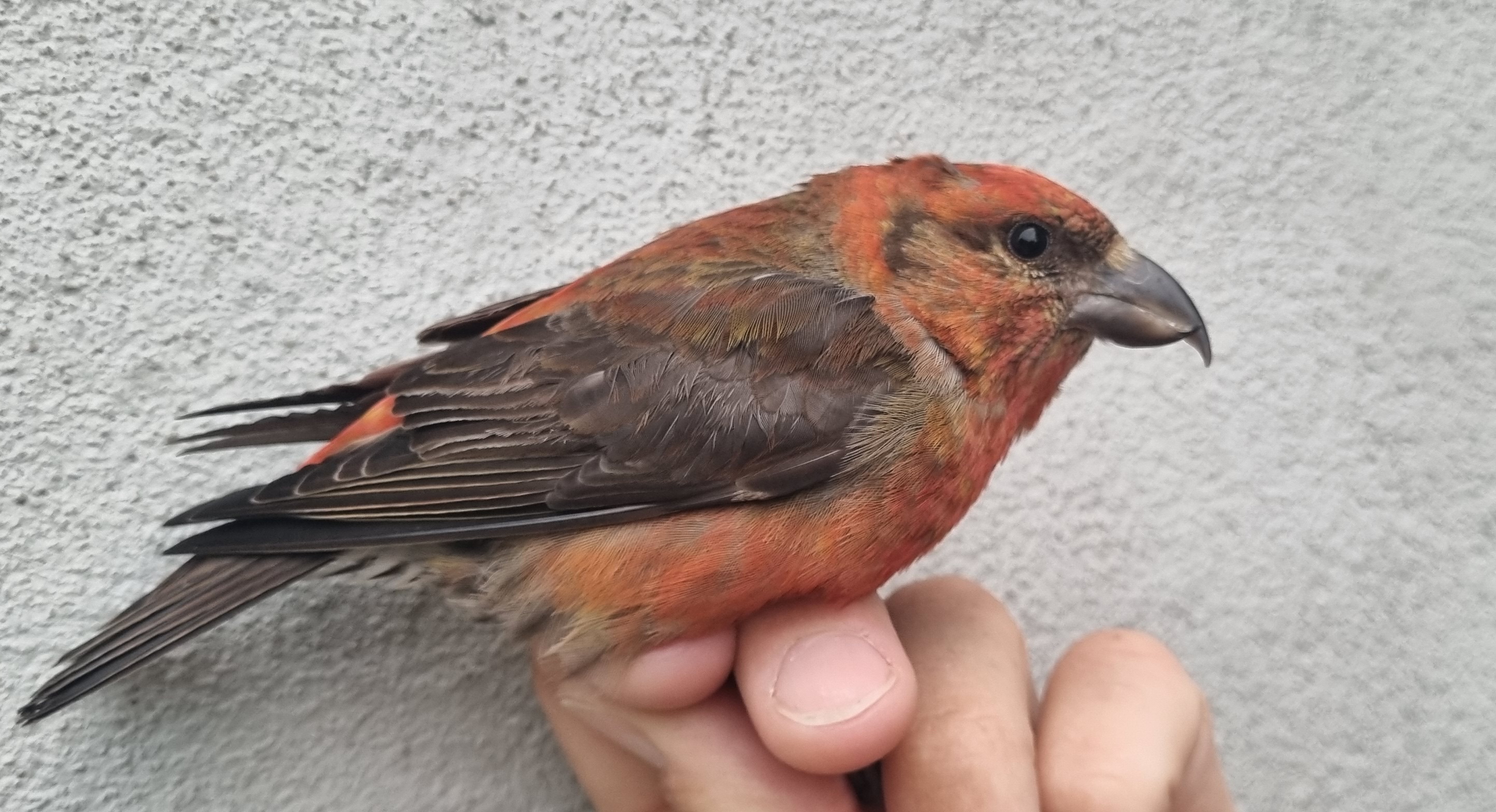
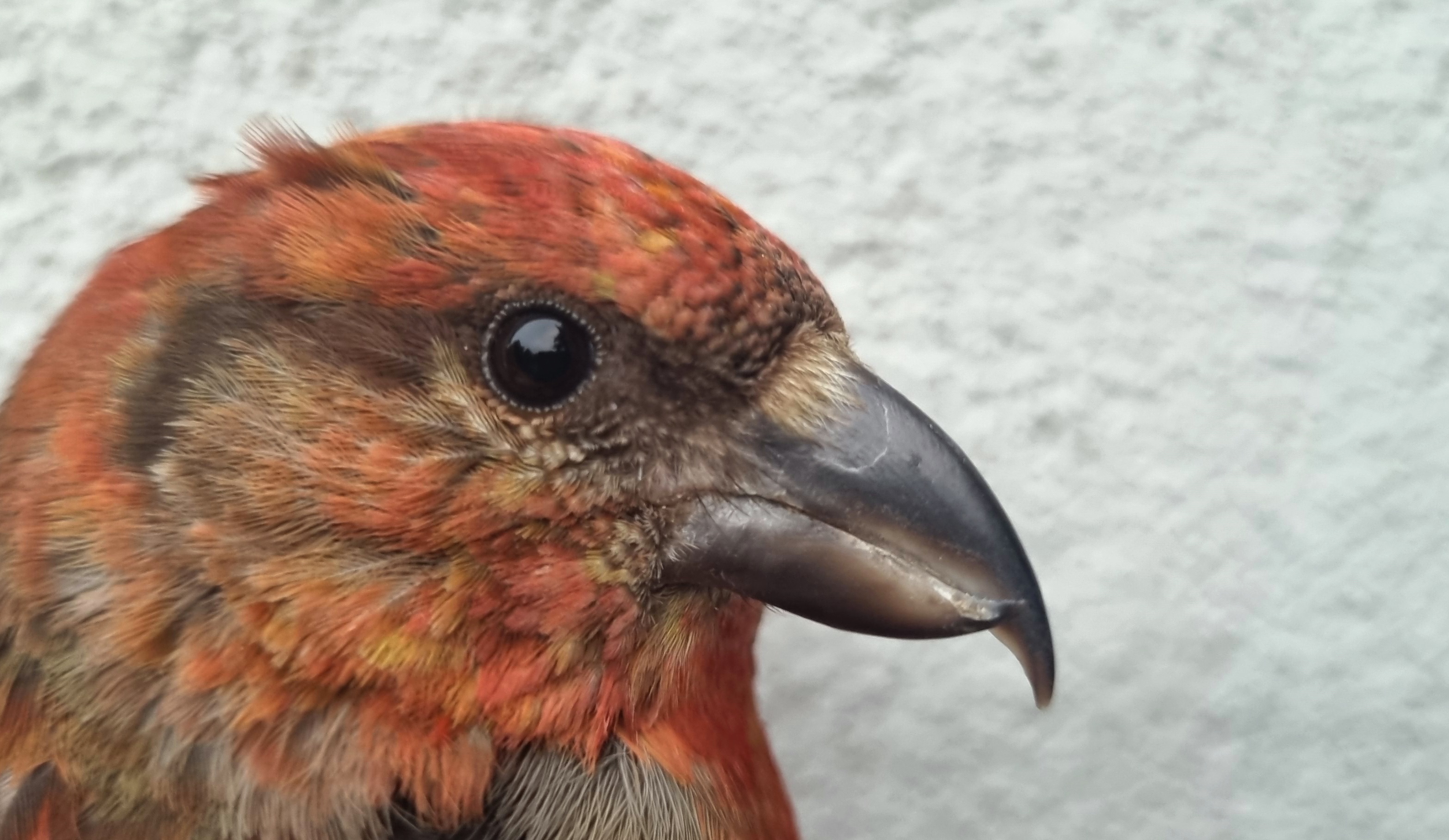
Male Crossbill Photo Morten Jenrich
I continued at the sea, joined by Bjørn, And a Local couple from Varde. We found a 3k Caspian Gull and an Egyptian goose.
After some breakfast i took a nap and in the meen time Henrik had seen a possible palid swift but despite the amount of details he saw he only had it shortly and didnt get proper documentation sadly.
Louise tried to hold and release a Common Whitethroat and a Crested Tit that Morten already ringed. Afterwards we went to the city to get some icecream and shop a bit, we wanted to make a bbq as the weather was finally rather comfortable.
When we came back we had some lunch and then went to the beach.
In the evening we had the Bbq and a rather big amount of Swifts was flying around the lighthouse.
After the dinner Louise drow home to Aarhus again.
Ringing totals:
House Martin 1/0
Redstjart 2/0
Blackbird 1/0
Song Thrush 1/0
Lesser Whitethroat 2/1
Common Whitethroat 5/2
Chiffchaff 1/0
Spotted Flycatcher 1/0
Crested Tit 5/1
Chaffinch 1/0
Greenfinch 1/2
Linnet 1/0
Redpoll 3/0
Common Crossbill 1/0
Total 26/5
People at the station: Bello, Henrik Kristensen, Anders, Svend Aage, Menno, Morten, Louise, Bjørn.
Dofbasen link
People coming in for "Pinsen"
During the day we had nearly more people at the birdobservatory than birds.
Anders came to update the database for ringdata, Bent came around and installed a new computer, Louise stayed and walked around with Bello, Henrik K. arrived for a weekend here, while Menno and I took care og 15 hours with all nets open.
It did gave me a few blodsamples for the WestNileVirus screening, but Menno had the best birds in the hand with a juvenile Stonechat (Sortstrubet Bynkefugl) and a recapture of an old Common Whitethroat (Tornsanger). That bird was ringed by Bent back in 2019 as an already adult male, so now it its at an age of 6k+.
A little funny story is, that the bird also was recaptured exactly one year ago on 4.th of June 2021.
From the walks in the area and the observations at the beach the best birds was 2 Artic Skuas (Almindelig Kjove), one Guillemot (Lomvie), a “white egret” probably a Great White Egret (Sølvhejre) but seen flying at too long distance and a White-tailed Eagle (Havørn).
We hope to have more birds to report tomorrow, as the weather looks promising with calm wind and higher temperatures – and not at least, more eyes to find the birds.
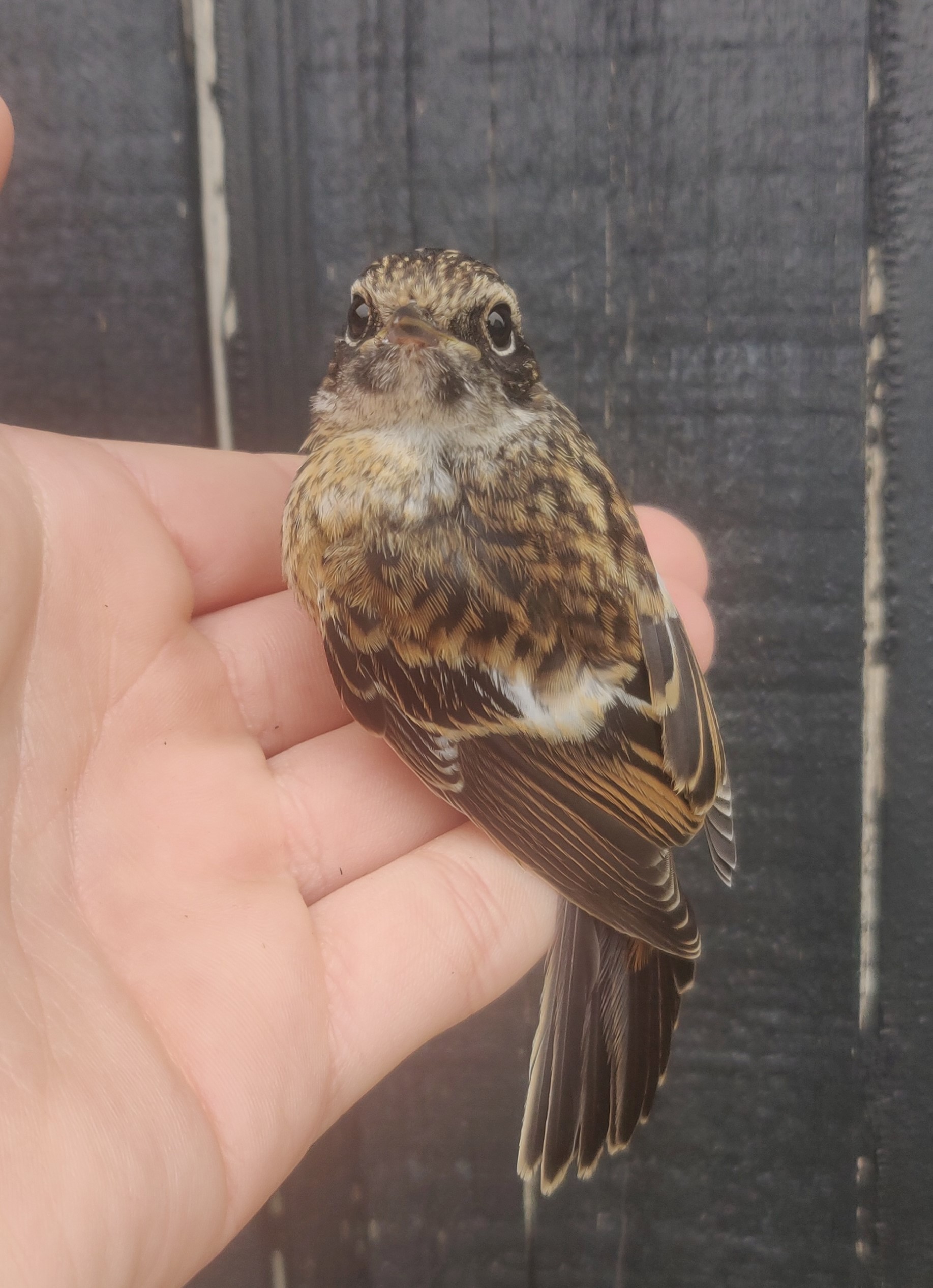
Young Stonechat. Photo Menno den Uijl
Ringing totals:
White Wagtail 1/0
Stonechat 1/0
Icterine Warbler 2/0
Common Whitethroat 0/3
Common Chiffchaff 0/1
Willow Warbker 0/1
Spotted Flycatcher 0/0
Crested Tit 0/1
Coal Tit 2/0
Great tit 0/3
Chaffinch 1/0
Greenfinch 1/0
Linnet 2/0
Redpoll 3/0
Total 13/10
People at the station: Bent, Mikkel, Menno, Louise, Henrik K, Anders Z. and Morten
Best bird a dead bird?
Today the ringing was quite slow, probably because of the time of year and the northwestern winds. The number of trans Saharan birds was also low, so Morten was not able to sample that many birds today. Maybe the best bird was brought to us by Anders M.. It was in completely fresh plumage, so that indicates that it is born this year here in the bog. It might not have been able to find enough food or had some kind of desease. Some more positive news is from the bluethroats, which also successfully bred in the bog.
At the end of the day Anders M. saw a eagle species at Groningen. He was not sure about the species and put it on Zello. We decided to post for some time and besides some buzzard we saw nothing. At some point I saw an eagle species at a very big distance, because of the movement of the hot air it was impossible to see anything on the bird. If it does not turn around and come to blavand again, we will never know which species it was.
Ringing totals:
White wagtail 2/0
Black redstart 1/0
Blackbird 2/0
Lesser whitethroat 1/0
Common whitethroat 1/0
Common chiffchaff 3/1
Spotted flycatcher 3/0
Crested tit 0/1
Great tit 3/0
Chaffinch 1/0
Greenfinch 4/1
Linnet 4/0
Redpoll 1/1
People at the station: Bent, Mikkel, Morten, Anders M., Anders Z. and Menno
A day short of birds
Rain showers in the early morning and too much wind from northwest gave us a day without the standard catching of birds.
I did try to open some of the nets when the rain had stopped around 7, but only half of the nets were enough sheltered from the wind to be open.
After 3 hours I closed them again – not a single bird had been in a net at that time.
At the beach Menno, Bello and I did some observations in the late morning after the rain.
It was very slow with movements of birds over the sea.
Only a few Gannets and Red-throated Divers amongst the Common Scooters, gulls and terns.
Best bird of the session was a roosting Great Skua some way out on the sea.
Then Bent arrived and was so kind to lend his car to Bello and I.
We had to post the WestNileVirus blod samples from Oksbøl before midday, to make sure they arrive at Statens Serum Institut within 24 hours.
When we were in Oksbøl, we made a big shopping of supplies.
Now we have food for the next 5 days to end of “pinse”, and can use our time in the field without thinking of shopping.
Meanwhile Bent made a walk in the surroundings – checking the Little Terns – but didn´t get any other really notable birds on that tour.
I could later confirm that in a walk before dinner.
My best birds around Mosen were a couple of Grey Partridge and a singing Marsh Warbler.
End of a slow day – we will be back tomorrow in better weather conditions!
People at the station: Bent, Bello, Menno and Morten
Young ones in the nets
We had all nets open in both gardens from 04:30 till 18 o`clock and continued at the station till 20.
It did not produce high numbers, but we did get some of the young tits, that are coming straight out of their nests in these days.
Both Coal Tits (Sortmejse), Great Tits (Musvit) and Crested Tits (Topmejse) was on the move.
I took my time at the stations ringing laboratory, as I was asked by the Danish ringing central to contributed to the national scheme of monitoring long distance migrants for West Nile Virus.
It involves taking a little blood sample from the wing of the bird and keep the sample cold till it is send for analysis at Statens Serum Institut in Copenhagen.
Menno took care of the birds caught in the Lighthouse garden and that arrangenment went well on a long day.
We might not be able to open nets tomorrow in windy conditions and some showers predicted for the morning, so we hoped to get most out of today.
It ended with a day total of 33 ringed birds and 7 recaptured.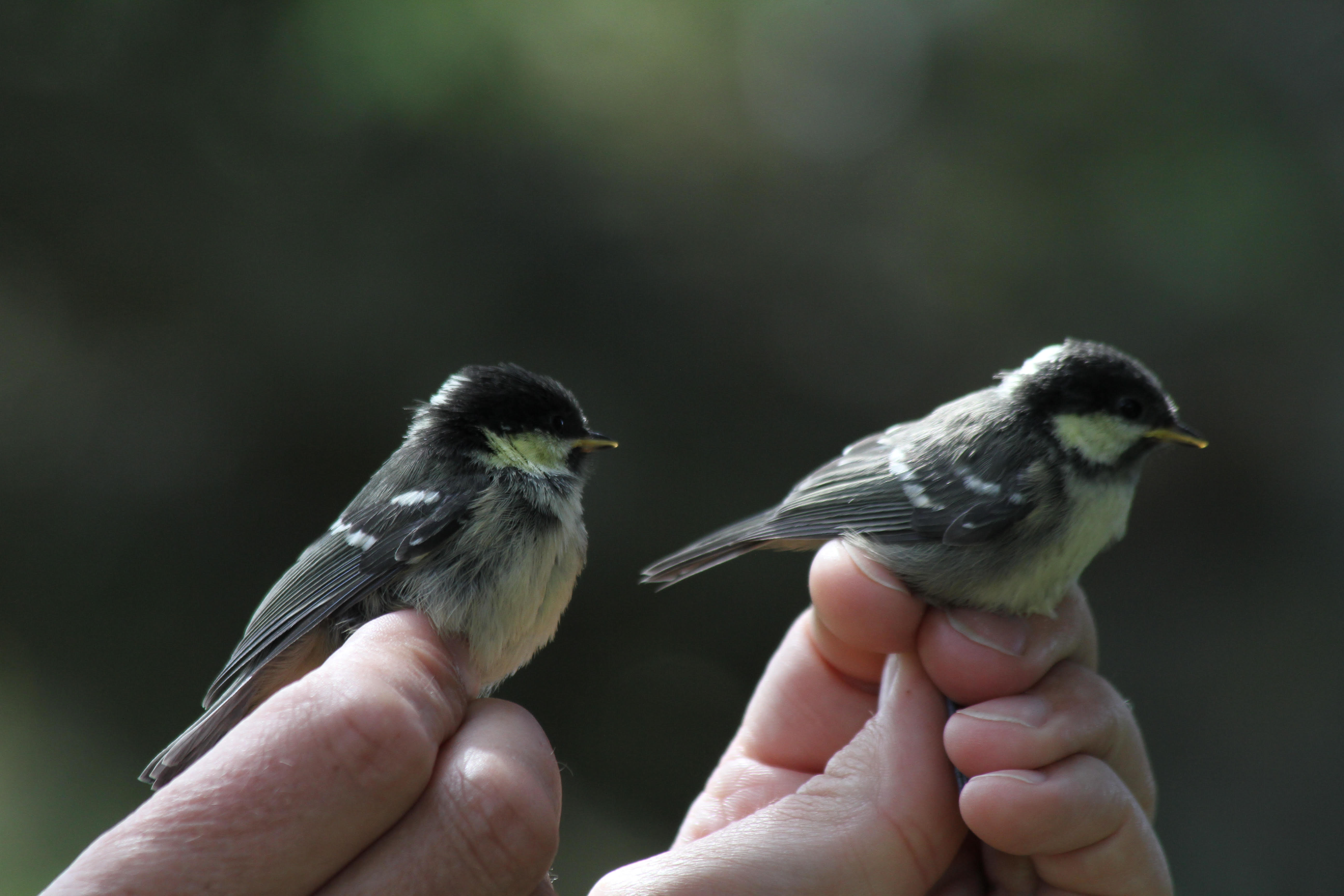
Young Coal Tits. Photo: Mikkel Bello
Young Great Tits. Photo: Mikkel Bello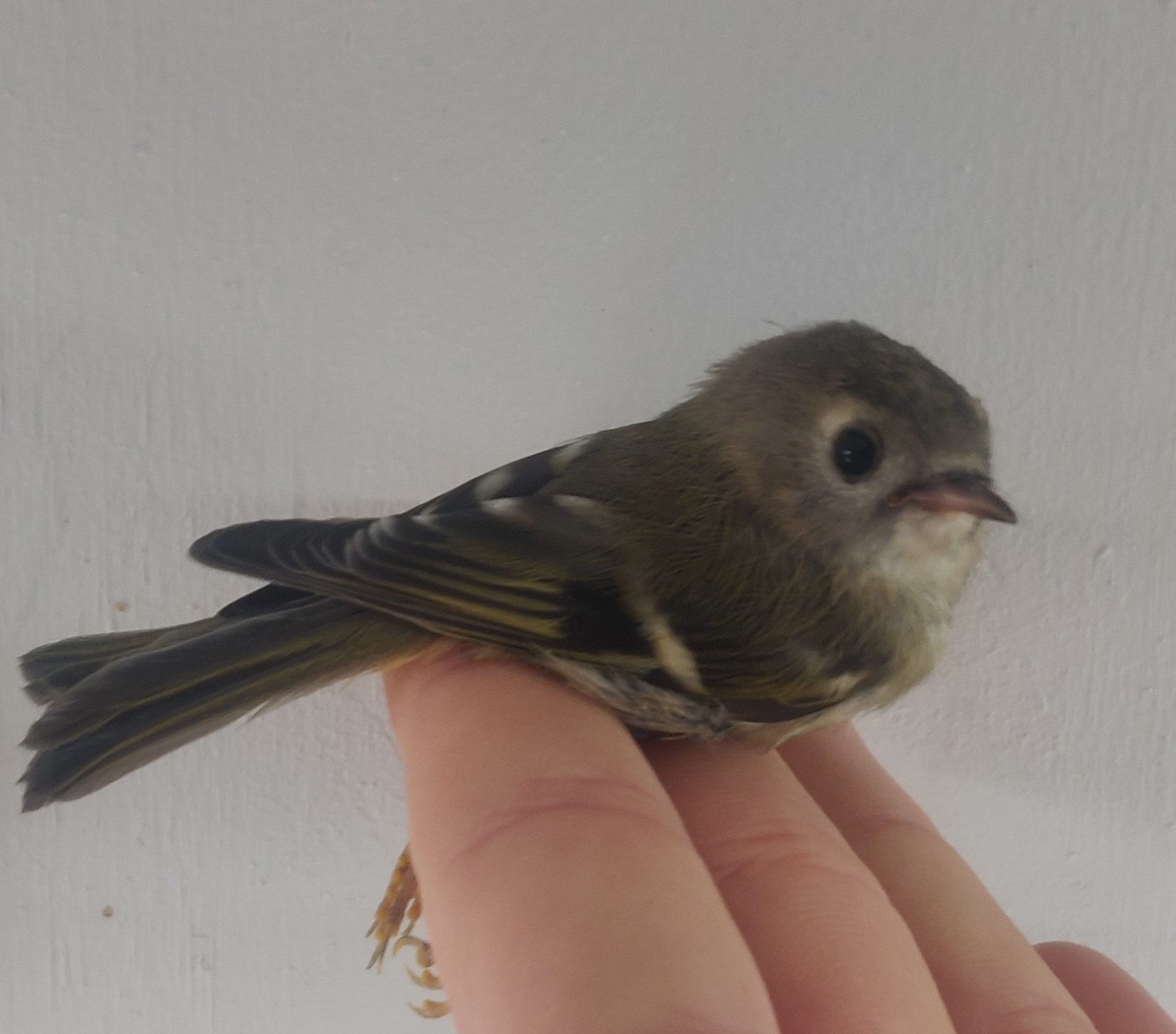
A young Goldcrest (Fuglekonge). Photo: Menno
Bello did some walks at the beach and at “Mosen” and on the moorland behind, but did not find any special birds this day.
Best was 3 singing Sedged Warblers (Sivsanger) and 2 Caspian Gulls (Kaspisk Måge).
On the beach the Little Terns (Dværgterne) have made a fast respons to Sundays reparations of the tilted fence around their nesting area.
On Sunday there were 4 active nests, Monday had 7 active nests and now there are 8.
We cross our fingers and hope, that tomorrows wind from northwest won´t make a new ravage of the tern colony.
Ringing totals:
White Wagtail (2/1)
Blackbird (1/0)
Icterine warbler (4/0)
Sedge warbler (1/0)
Marsh warbler (1/0)
Common Whitethroat (1/1)
Blackcap (2/0)
Chiffchaff (1/0)
Willow warbler (0/1)
Goldcrest (1/0)
Great Tit (9/0)
Crested Tit (3/1)
Coal Tit (3/0)
Lesser Redpoll (1/2)
Linnet (1/1)
Greenfinch (2/0)
People at the station: Bello, Menno and Morten
A short retrospect of the month May
Last month, May we were able to have the nets up for 28 days. On one of these days, we could not start at the standardized time because of the harsh weather conditions. On most of the days we continued catching up until late afternoon in the hope to get a rarity in the nets. In total we ringed 599 new birds and had over 150 recaptures.
The most numerous species were as you can expect the chiffchaff and willow warbler. It was also nice to see that there has been some passage of trans Saharan migrants, with besides willow warbler but also around 20 records of pied flycatcher, Common whitethroat, Lesser whitethroat, Icterine warbler and common redstart. Highlight of the month were the red breasted flycatcher, house martin, barn swallows and nightingale.
Official Last Day
The count this morning was accompanied by Henrik and Morten. We had another Capsian Tern (rovterne) and 2 Arctic Skuas the rest was slow. A walk in the bog was not alarming either, a Marsh Warbler and a Sedge Warbler were the highlights.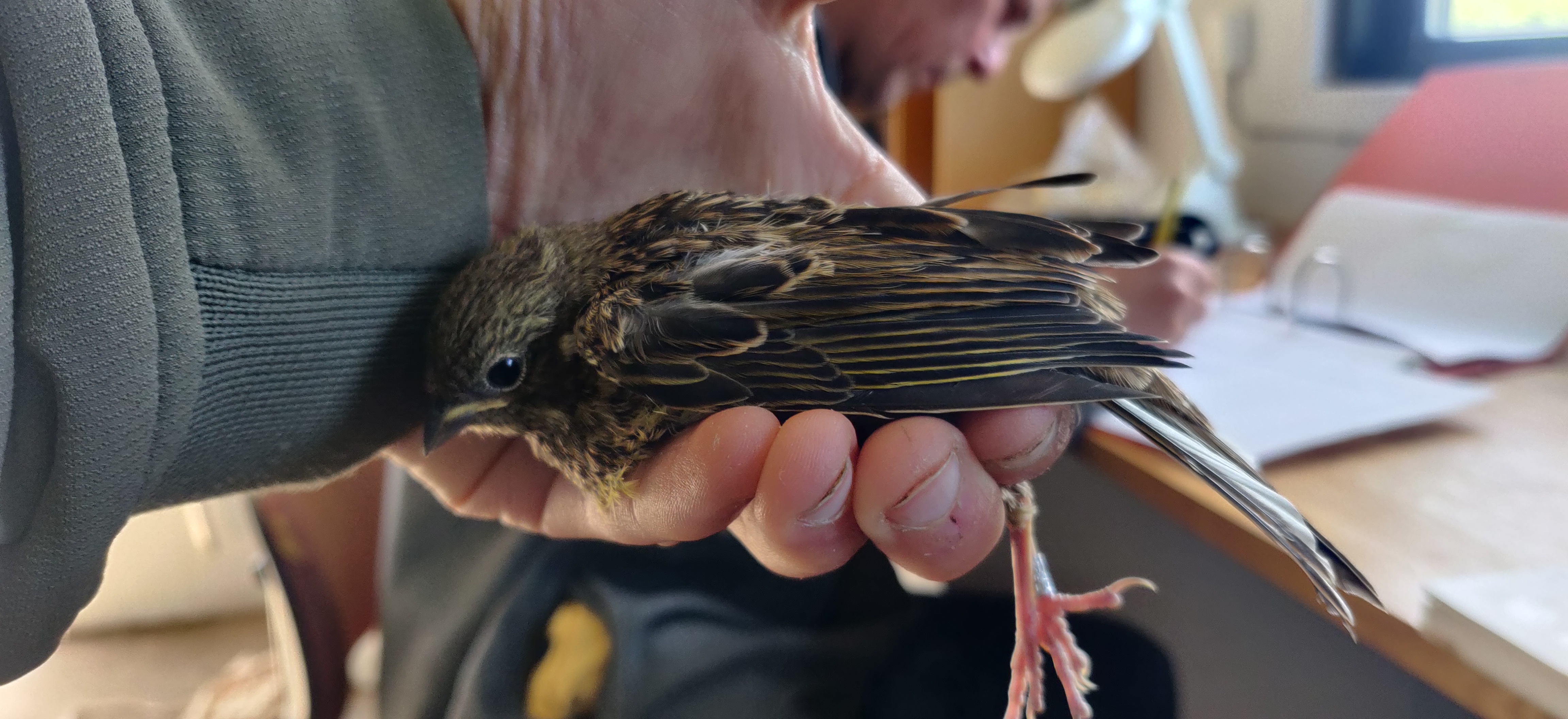
Juvenile Yellowhammer. Photo by Menno
The ringing today was low on numbers but some highlights: Reedwarbler(1st this year), a Barnswallow was also a great one.
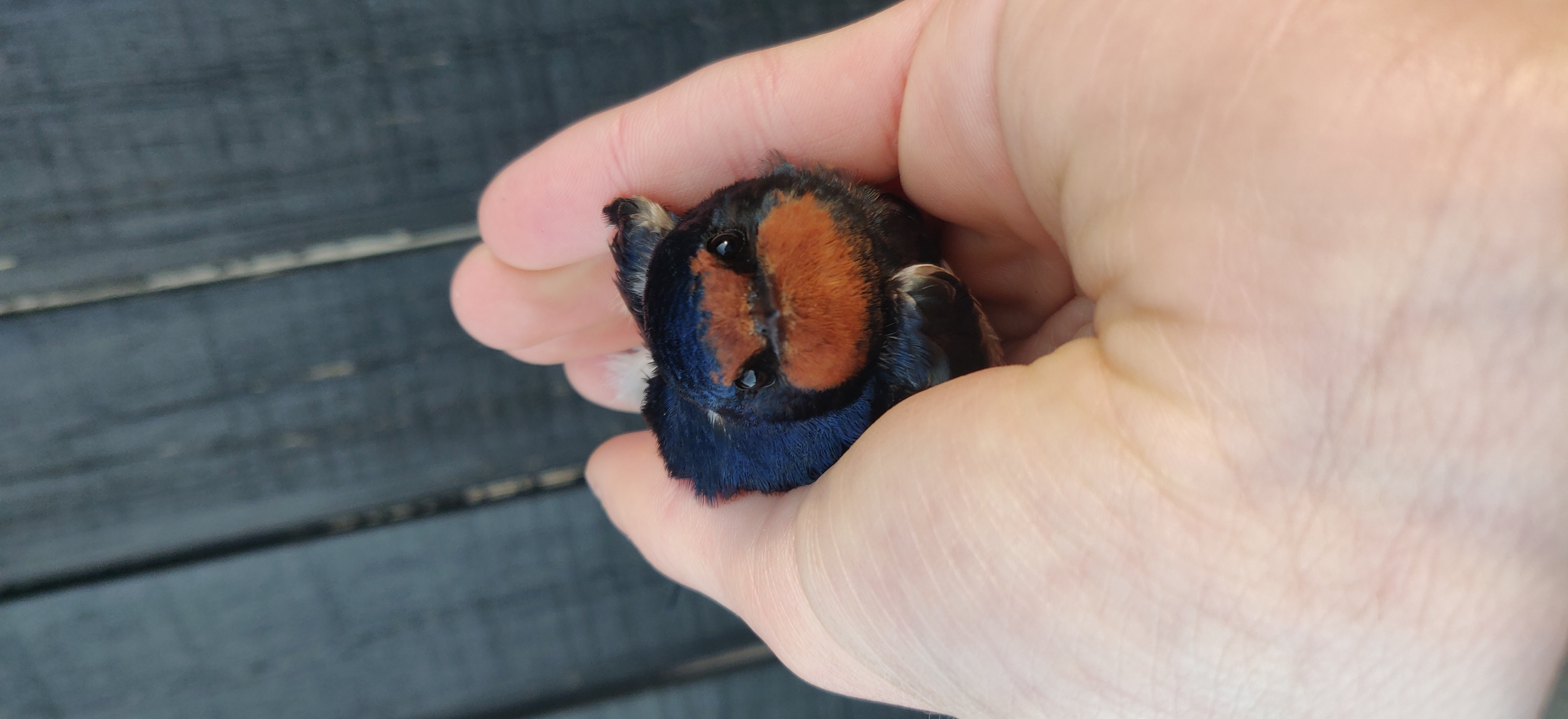
Barnswallow. Photo by Menno
The spring season is from the 1st of Marts until the 31st of May, which means that today is my last day as a counter for Blåvand.
It has been a wonderful experience! I have found my new favorite location for several reasons! The atmosphere here is just amazing, you get a feeling that anything can happen, and it shows that it is indeed the case, mentioning the Moltoni´s Warbler.
Then the people around the station and the local birders are so friendly and caring! Also, the area is so beautiful and to have hundreds of Red Dears, Salamanders and other animal life in the area make it "almost" always interesting to walk around!
And for the spring I think especially the area is not so crowded with birders so you can walk around on your own a lot which I prefer from Skagen. The only downside is that there is very few raptors out here.
I will stay the week out and maybe a couple of days into the next one if the weather looks good and I will make the goodbye then! 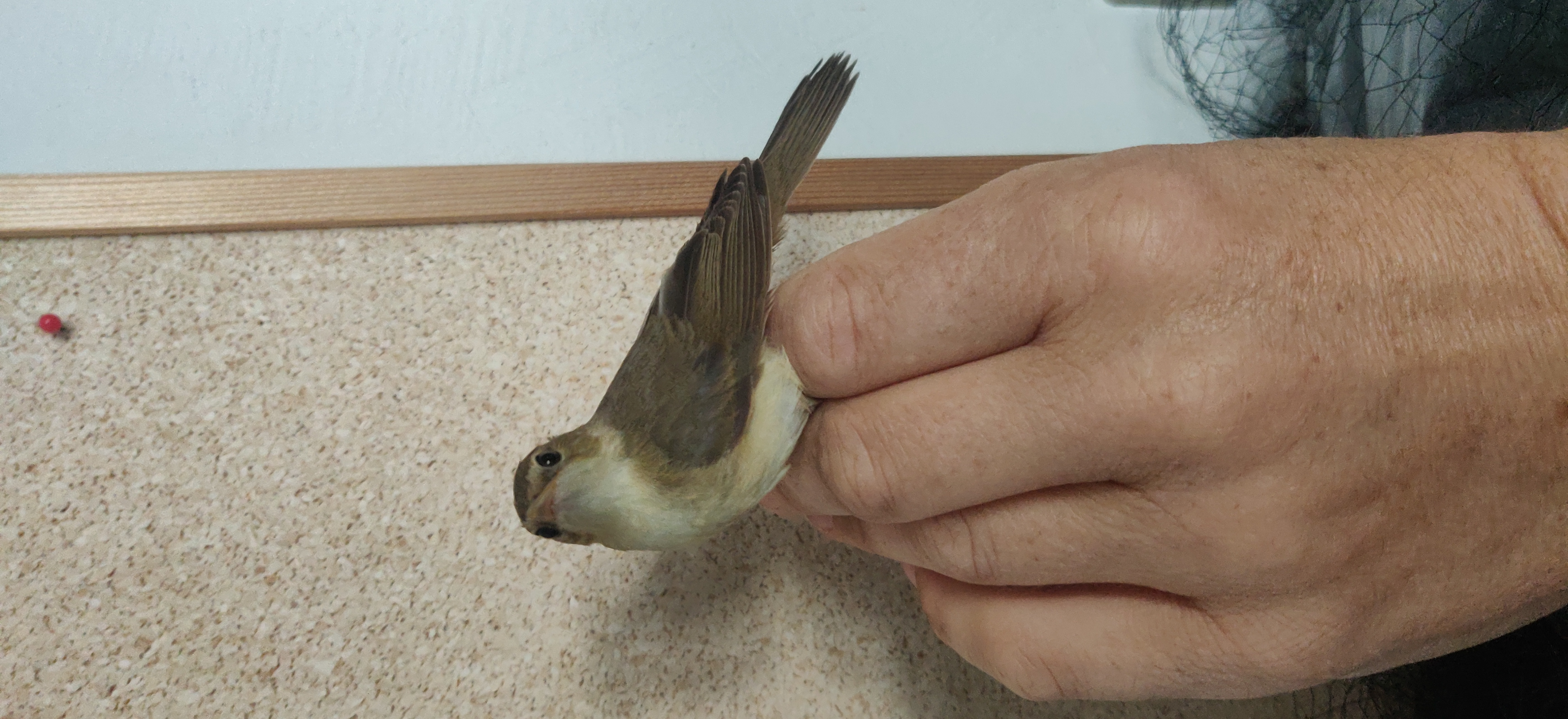
Reedwarbler. Photo by Menno
Dofbasen link
People at the station: Bent, Henrik, Menno, Mikkel, Morten
Ringing totals:
Barn swallow 1/0
Blackbird 1/0
Reed warbler 1/0
Icterine warbler 2/1
Lesser whitethroat 0/2
Common whitethroat 1/0
Chiffchaff 1/1
Spotted flycatcher 1/0
Crested tit 2/2
Tree sparrow 3/1
Chaffinch 3/1
Greenfinch 4/0
Linnet 3/2
Redpoll 2/0
Yellowhammer 1/0
Best day of the season?
After two rounds with almost empty nets, Bello saw two Caspian terns flying north. This triggered Morten and me to also a seawatch in between the ringing. Morten joined Bello, and I took my seat at the ringing hut. Bello gave a great skua through which I could see very nice. Shortly after that I saw a giant diver flying far north over the windmills. The size and the very obvious neckband despite the distance I was sure this must be another yellow billed diver! Unfortunately it was flying north and missed by Bello and Morten.
When the migration was slow I joined Bello to see an exhausted kittiwake, we thought it would wash up but after the high tide I didn’t find it on the water. The next round was very nice with a house martin and a stonechat, another highlight! Then I helped Morten ring some greenfinches since there were high numbers at the station. Around the same time Svend and Bent arrived with some treats from the backery. Thanks again for that! The afternoon was quite slow so I decided to mow some grass underneath the nets. While doing that, Bello went to the bog and found a Turtle dove. It is still a lifer for me, so I went to see it. When I arrived there I saw that Morten also arrived already. After a good look and a quick check that it was really a turtle dove and not a eastern turtle dove I resumed the mowing. At six, just before dinner another highlight made its appearance, two juvenile crested tits were in the nets. A species I would really have in hand, and Bello enjoined one up close as well.
This was another good day at Blåvand!
Ringing totals:
House martin 1/0
White wagtail 1/0
Stonechat 2/0
Blackbird 1/1
Song thrush 1/0
Icterine warbler 3/0
Lesser whitethroat 1/1
Common whitethroat 0/1
Chiffchaff 6/0
Willow warbler 1/0
Spotted flycatcher 0/1
Crested tit 2/0
Starling 1/0
Tree sparrow 0/3
Chaffinch 5/0
Greenfinch 5/1
Linnet 6/1
Redpoll 1/0
The pictures of this wonderful day. All pictures have been taken by Bello
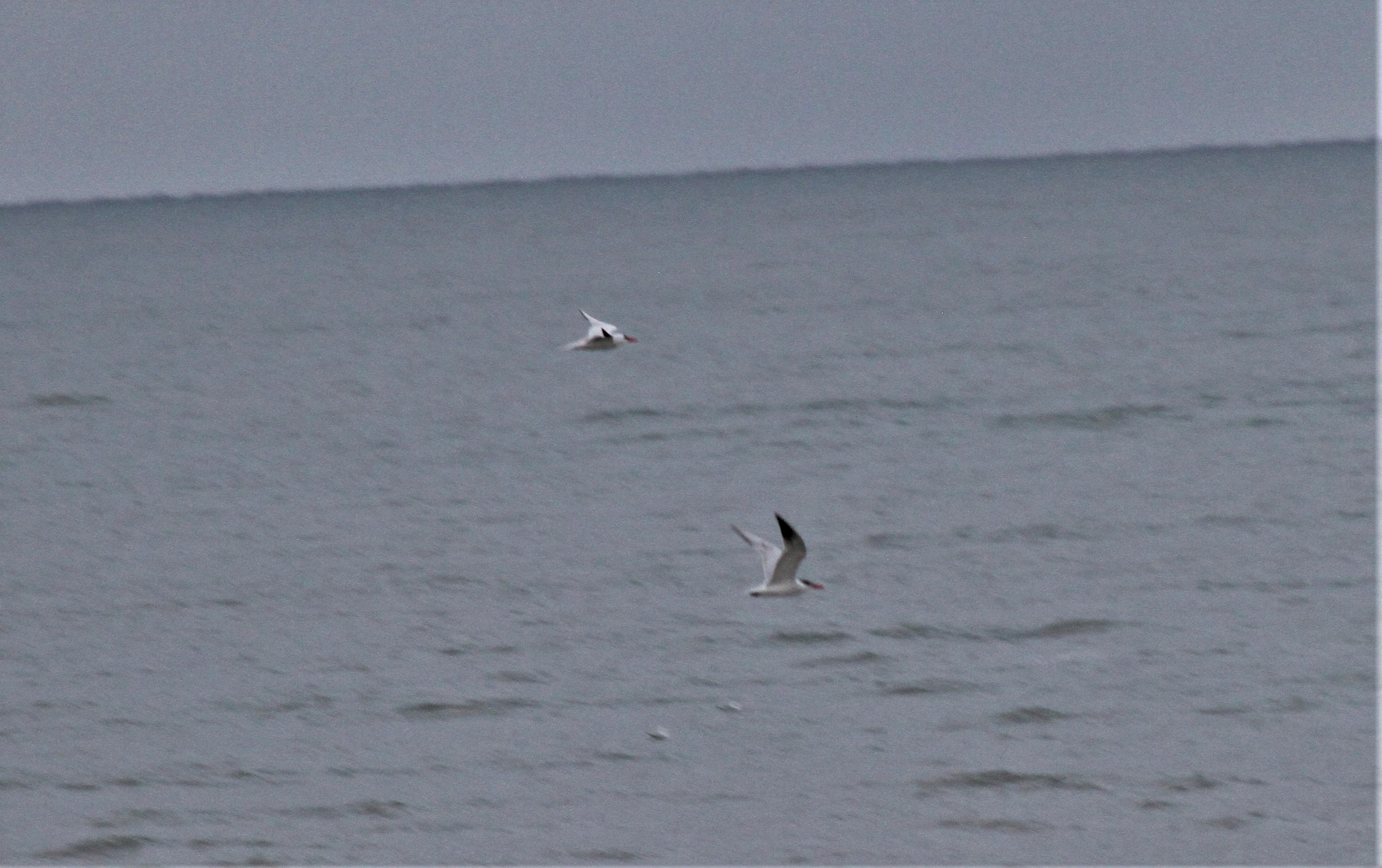
Caspian tern

Crested tit
Turtle dove
Yellow-billed Diver!
With moderate wind from WNW in the morning, Menno and I managed to open half of the nets in both gardens – the rest of the nets was to exposed for the wind.
At least it was the first chance to open nets after 3 days of too windy conditions.
While we were doing the rounds in the two gardens, Bello and David took the morning observation from Sydhukket and later got company from Henrik and Sven.
The ringing was a bit slow with a total of 11 ringed birds and 7 recaptures in 7 hours, and we closed the nets again around 14 o´clock as the wind speed increased again.
Best bird in hand was a recapture of a Yellowhammer ringed here back in August 2019.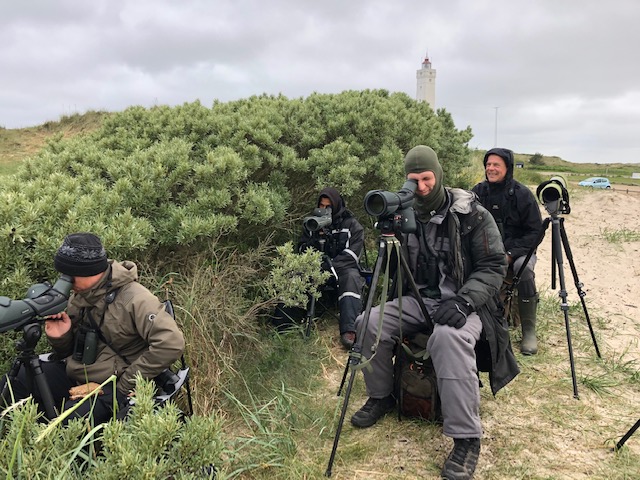
Todays seawatch gang. From left; Henrik, Mikkel Bello, David, Morten. Photo by Sven.
Much better was the bird of the day at the sea.
The observers reported a slow morning with few birds, but just one bird can be enough to get happy smiles on the faces (maybee not on my face, as I missed the bird with less than one minute, while I was walking to the observers at the sea between a netround :-) )
A stunning adult Yellow-billed Diver (Hvidnæbbet Lom) flew north over the sea at a range, where the view in telescopes was perfect and within reach of the lens of David camera.
Only the 8´th spring record of White-billed Divers at Blåvandshuk since the start of the Birdobservatory! Also an Egyptian Goose was spotted a bit later which is also the 8th spring record.
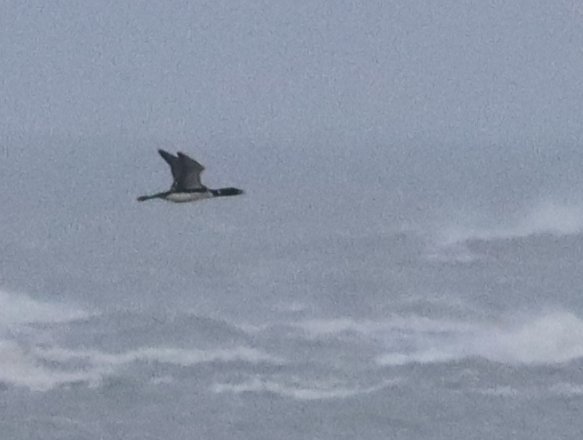
Yellow-billed Diver (Hvidnæbbet Lom) Foto: David Manstrup
After the standard time of observation was done, Henrik went home and was exchanged with Bent, who arrived after we had a fine breakfast, as Sven had brought us bread from the baker.
Sven, Bent and Bello then went to beach to fix the fence at the tern colony after the wind and high tide had laid it down.
It went well for then, so they came back to the observatory in time to have some nice social talks and good histories before Sven, David and Bent went home.
Now Bello, Menno and I have a relaxing evening and prepare ourself for a fine day tomorrow with light wind conditions, so we can use all nets tomorrow.
Dofbasen link here
Ringing totals:
Starling (2/0)
Icterine warbler (0/2)
Lesser Whitethroat (2/0)
Chiffchaff (1/2)
Willow warbler (2/0)
Spotted flycatcher (1/0)
Lesser Redpoll (0/1)
Bullfinch (1/0)
Greenfinch (1/1)
Chaffinch (1/0)
Yellowhammer (0/1)
People at the station: Bello, Menno, Morten, David, Sven, Henrik and Bent
Bittersweet
Today we both started at the seawatch. Because of the northwestern winds we spent some time to find a good place in shelter. While looking for a good place we heard a bee-eater. A really good species and for both of us a new species for Denmark! We both saw it in southern Europe. During the rest of the seawatch it was slow. But the gannets offered us close looks and we were able to assign some types to some of them.
I went to the Sabine bunker, Menno didn't want to join, not so excited about shearwaters. It was an Exhausting walk there but inside it was perfectly sheltered.
there was not much, some gannets close and far.
So when I spotted a long winged bird on the horizon I expected another gannet. I got freaked out a bit because it looked different! First impression was a dark bird with long wings, which is nothing special in itself but I noticed the size and angle of the hand which was slightly bent backwards and was rather short compared to a very long arm. It was flying in curves and disappeared behind the waves a lot. I noticed it had very straight and long wings with black upperparts, I started to suspect Albatross and my heart rate was raising for sure!
At some point it flew together with an adult gannet and I was able to compare the two well. The gannet was noticeably smaller with a pointed tail where the other one was bigger and without the pointy impression. I remembered from earlier this year when the albatrosses were seen several places near Denmark, where I looked up characteristics of it and knew it should have white upper rump and dark tail. I was not able to see this on the bird and it is still bothering me. I am confident that I have seen something that was not a Gannet, and strongly believe it must have been an albatross. Hmm.. I will however send it to the rarities-committee (SU)
About 45 minutes later I noticed a bird going in really high curves south. There have been some gulls but they look like they are blown more than they are flying but this one was almost just hanging out. I get the scope on it and see a very dark bird that looks blackish in contrast to the clouds. Common gull in size i think, with pointed wings and short tail, which it was spreading at some point. It flew very controlled and was not in a hurry as it was going south. A sooty Shearwater. I wonder what makes such a difference in flight ability.
The seawatch was very successful though a bit bittersweet as the albatross hardly will be approved I think.
Today Morten joined us, and David gave us a visit. We had dinner together, we decided to get some pizza. So Bello can celebrate his Albatros, Bello and me can celebrate the bee-eater and Bello, David and me can celebrate the moltoni’s warbler.
